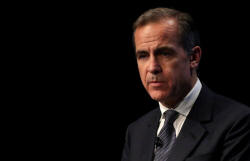|
Volatility in bond yields - as seen after the election of Donald
Trump as U.S. President - suggest the BoE should take a cautious
approach, and also ensure borrowers can cope with other shocks
such as a rise in unemployment, regulators said.
Last week the central bank said it was not changing the mortgage
rules set up in June 2014 to stop risky borrowing, and on
Tuesday the central bank published more on why in a record of
the November meeting of its Financial Policy Committee.
One of the rules requires British borrowers to be able to cope
with a 3 percentage point rise in their mortgage rate before
taking out a loan.
At the time when the rule was introduced, markets expected BoE
rates to rise by 2.25 percentage points over the next five
years, but in November they priced in a rise of just 0.75
percentage points.
"The committee discussed whether this should prompt a change in
the interest rate stress test," the record of their meeting
said. One argument against was that "relying too heavily on
market yields would be imprudent, given that market prices were
volatile ... as evidenced by the sharp increases in sovereign
yields that had followed the U.S. election result."
Some policymakers also said home-buyers were likely to find it
easier to borrow anyway as lenders would lower their mortgage
rates, even if the BoE did not loosen its own rules.
The BoE said the proportion of mortgages that were rejected had
not changed significantly since it introduced its policies, but
they may have stopped a deterioration in lending standards.
Last week the BoE released a half-yearly report on financial
stability and said risks had risen following Donald Trump's
unexpected victory in the U.S. presidential election. It also
pointed to dangers from rapid Chinese credit growth or a chaotic
British departure from the European Union.
The rest of the record stuck very closely to the message in the
report, with no sign of disagreement on the FPC, which includes
a mix of Bank of England staff, the head of Britain's Financial
Conduct Authority and independent external members.
(Reporting by David Milliken and Huw Jones; uk.economics@reuters.com;
+44 20 7542 5109)
[© 2016 Thomson Reuters. All rights
reserved.] Copyright 2016 Reuters. All rights reserved. This material may not be published,
broadcast, rewritten or redistributed.
 |
|





